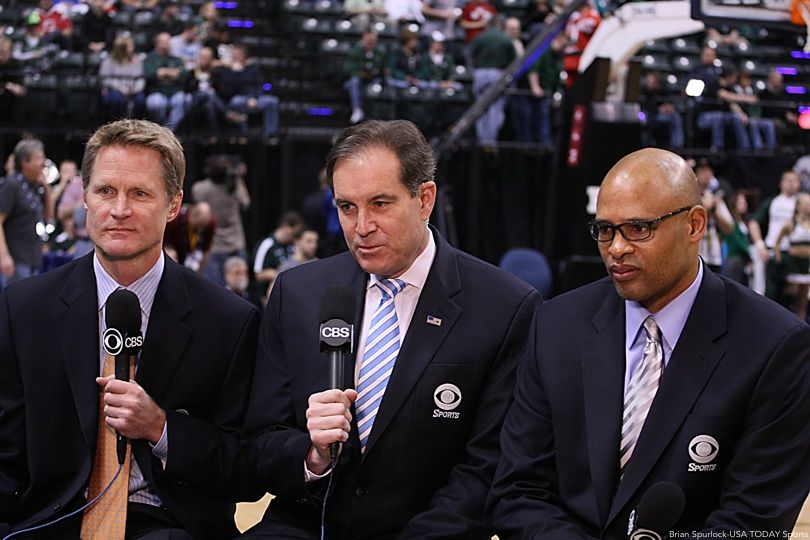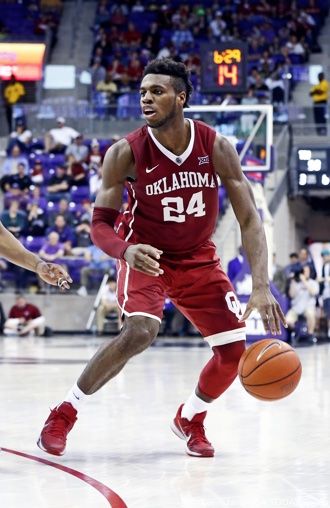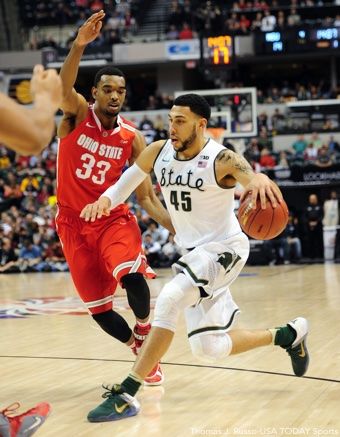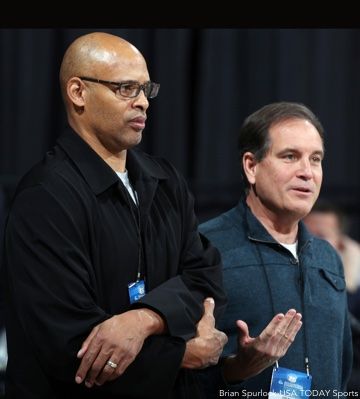Clark Kellogg is the guru of college basketball. The former Ohio State star and NBA player has been an NCAA basketball analyst since 1990. This year, Kellogg will serve as a studio analyst for CBS and broadcast the Final Four on Westwood One. Talking with ThePostGame, Kellogg breaks down the bracket, explains how the CBS Selection Show dealt with a leaked bracket and explains what he would improve about the NCAA.
ThePostGame: When you first saw the bracket in the CBS studio, what were your initial reactions?
CLARK KELLOGG: I was a little surprised St. Bonaventure didn't make the field. I thought that team had done enough to warrant and deserve being there, but compared to Syracuse and Michigan and Tulsa, as the votes were tabulated, they ended up maybe a vote or two short of being able to get into the field. That's what happens when you have deserving teams, a number of them. It's both objective and subjective, as the committee tries to differentiate teams and the Bonnies came up just short.
That was really the only team I thought warranted being in that wasn't able to make it into the field. You can make a case for Monmouth, and I thought they had a good case, but compared with those other teams I mentioned, they had three losses against the bottom 200 in the RPI. That differentiated them in terms of eliminating them from the discussion with those other teams.
TPG: But did you enjoy watching Monmouth this season?
KELLOGG: Oh, yeah, I love watching them. I was hopeful they'd be part of the field, but again, when you don't win your conference tournament, that puts you in the at-large pool -- you're automatically in the at-large pool if you won your conference regular season championship, which they did. I thought they'd done enough to get in, and then you start peeling back that onion, and looking for things to differentiate teams -- quality wins, terrible losses -- and the terrible losses I think, in this case, cost Monmouth, according to the committee (Three of Monmouth's seven losses were to Canisius, Army and Manhattan).
TPG: A lot of people just start paying attention to college basketball this week. In the simplest sense, what did people miss this year?
KELLOGG: They missed tremendous seniors, who had developed over the course of their career into All-America type players–Buddy Hield [at Oklahoma], Denzel Valentine [at Michigan State], Perry Ellis at Kansas, Tyrone Wallace at Cal, Georges Niang at Iowa State. I can go on and on with just an outstanding crop of seniors, who maybe weren't as highly-touted coming into college, but through diligence and hard work and staying the course have made themselves into outstanding college basketball players and many will have the chance to play professional basketball.
The other thing is the significant parity. This has been going on the last 15-20 years, where the gap between the perennial powers and the mid-majors and the lower-profile conference teams has just continued to be squeezed. This year, we saw it squeezed like it hasn't been in a number of years, in terms of exciting games with unranked teams beating ranked teams and that type of deal, which I think sets up for an exciting ride as we get ready to start the tournament.
TPG: Why has the parity developed?
KELLOGG: One, you've got the NBA rule that was instituted back in 2006, where elite high school players have to be one year removed and 19 years old before being draft eligible, so you ended up with a tremendous crop of freshman over the last 10 or 11 years, who, perhaps would not have gone to college, spending at least a year in college. Even though talent is great, sometimes when it's young, it makes way for older, seasoned teams, that typically, are the way some of the non-power conference teams are built, to be competitive.
I think the other thing is the exposure the game gets. Kids now see they can have a great experience at the Division I level and not necessarily have to go to North Carolina or Duke or Kentucky or Kansas or Indiana or any other school that you name that's a brand name because you can have success in your league or even in the tournament at somewhere that may be smaller but just as competitive in terms of basketball.

TPG: On one end, seniors Buddy Hield and Denzel Valentine had a great year on great teams, and on the other, you have freshman Ben Simmons not even making the tournament. What did this year do for the one-and-done debate?
KELLOGG: I think it's a year-to-year situation. This year's crop of freshmen–and there are a ton of really good freshmen–there's not the elite level of freshmen we've had in recent years. Last year, we had [Jahlil] Okafor and Karl-Anthony Towns and D'Angelo Russell, all that ended up being top ten draft picks in the NBA.
With the exception of Ben Simmons, maybe Ivan Rabb and Jaylen Brown if they elect to leave, I don't know if we have anybody else. I think the only sure-fire top ten pick if he elected to go pro would be Simmons. Others would be pros, but I don't know if they'd be high draft choices. It's just a year where the freshmen draft crop was not as brilliant as other years, but it's not something to make a trend on or make an overwhelming statement about because it's just one year.
TPG: What team has the most to prove in this tournament?
KELLOGG: Villanova. I don't think there's any question about that. Not going beyond the second weekend since 2009, when they got to the Final Four, that puts a bit of a target on you when you've had relatively high seeds–they've done a good job with that. I think Villanova would be the consensus answer.
TPG: What are the most overrated and underrated teams in the field, in terms of seeding?
KELLOGG: When you start talking about seeds and trying to differentiate between one or two lines, it's really a feudal exercise. I couldn't even begin to answer that. There's nobody that's…Kentucky made a comment, and maybe a legitimate one, they could have been a No. 3 and Texas A&M could have been a No. 4, but that's one line.

TPG: You had to deal with the leaked bracket during the Selection Show on CBS. How difficult was that to swallow and how does the NCAA deal with that?
KELLOGG: I don't know. Security has to be as tight as it can be. There's no perfect solution I don't think. I'm sure they'll look at it. It was a little deflating and disappointing. Difficult is probably too strong of a word for us. We still had another hour of a show to get through, so we basically focused on continuing in that vein. It certainly was disheartening and deflating that something we look forward to sharing with the public had been compromised through a leak on social media, but such is the world we live in.
Now, you go back and take a look at it, see how it happened and how you might correct it and keep it from happening in the future, but as far as the show, we had to continue on and I think we did so in good stead.
TPG: Were you guys notified about the leak?
KELLOGG: Everybody has a cell phone in our building. Doug Gottlieb knew as soon as it was happening. We have commercial breaks and guys take a peek at their phone and he's obviously got tremendous contacts in college basketball through coaching and being an analyst and his talk show and he actually got some reach-outs via text that the bracket was out there and it was confirmed as being the one we were trying to reveal exclusively, so there was nothing we were able to do at that point. It was like a flood.
When water starts moving, there's not a lot you can do to stop it. It was disappointing, disheartening, deflating, but not devastating.
TPG: I was just reading on Twitter someone said Greg Gumbel and Clark Kellogg used to do a 15-minute Selection Show and this was two hours. How did it feel going for two hours?
KELLOGG: It was the first time we stepped into that territory. It was new and different. I thought it flowed quite well considering the elements that we had and the way we tried to format it. I thought it was pretty good. Obviously, there was a bit of a wrench, pretty big wrench, thrown into things from the standpoint of the bracket getting out about mid-way through.
I'll go back and re-watch it, sometimes you don't get a full sense in the middle of doing something, but I felt pretty good about how the show flowed. It was certainly longer. The viewing public obviously accustomed to a shorter show would have to adjust over time if we continue to go in that direction. In the present, I thought it went off pretty well.

TPG: What is one thing you would change about the NCAA Tournament?
KELLOGG: One thing I would change about the NCAA Tournament…wow…man, it's not perfect. I don't think we'll ever make it perfect. I don't have a suggestion for what I would change. The way the teams are selected is fair. The way we structure the tournament with the 68 teams, with the First Four and Dayton is good and adds to the excitement, 68 is the right number it feels like to me.
There's still one or two teams you feel could have gotten in, maybe three, but just didn't make the cut, so you feel like it's something that is cherished and earned and extremely valued. It's not easy to get there. Three weeks to a championship, I think that's good. Enough time to enjoy the excitement and not too long that it drags out. I obviously have a lot more that I like about it, so I wouldn't change anything.
TPG: What is one thing you'd change about the NCAA?
KELLOGG: Well, that's a long discussion and we don't have enough time. I want to see student-athletes have a great experience at their institution. I want to see African-American athletes, particularly in football and basketball get meaningful degrees. I'd like to see the schedules reduced, so that the time invested is not as much as it is. I'd like to see less year-round commitment to practice and sport, so that kids would have a chance to enjoy summer jobs and some of the other things that are part of the college educational experience. I'd like to see a reduction in the game schedule in college basketball to 25 or 28 instead of 33 or 34.
Those are some things, and it's not easy to do any of that, that's just an aspirational wish list, but pounding the rock and chipping away, perhaps, you can make some headway in some of those areas and really enhance the welfare of the student-athletes, the educational experience, the preparedness for a non-professional sports career, which is what the vast majority of Division I athletes are going to encounter upon, being done with their eligibility, and making sure those playing in the revenue-generating sports are in a position to be prepared in that way, as much as they should be, and it's not happening to the degree that I think it should in that space.
TPG: In terms of Ohio State, what happened this year?
KELLOGG: It's a young team that just didn't have a ton of talent and never could really muster up enough significant wins to be NCAA Tournament-worthy. With that said, they play an NIT game tonight against Akron and they'll have a chance for additional practices and more games, and they'll have a chance to compete for an NIT championship, which would serve a team that had no seniors quite well, in terms of their development, going forward.
TPG: Who's your pick to win it all this year?
KELLOGG: I have Michigan State at this point, but I do two or three brackets. North Carolina and Michigan State are on the same side. They are my two favorites. I have Kansas and Oklahoma coming out the other side. I'm still trying to figure out how I'm going to massage my bracket. The three brackets that I do will have Michigan State holding the trophy at the end of it.
TPG: What are you doing with Capital One?
KELLOGG: Capital One serves as an ambassador for the Capital One Cup. It's a race, not only for a trophy based on top ten finishes in national champions across 39 sports in men's and women's athletics, but it's also a chance to win scholarship money (a combined $400,000) for those programs that are the winners of the Capital One Cup. In the NCAA men's and women's basketball championship, the championship teams will win 60 points for the Capital One Cup.
-- Follow Jeffrey Eisenband on Twitter @JeffEisenband.






